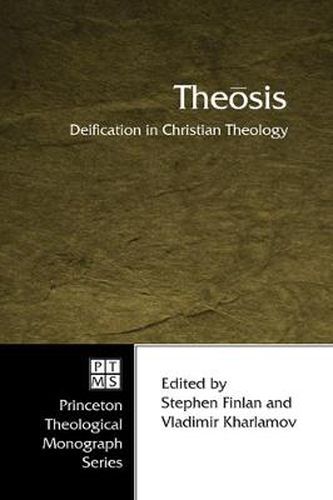Readings Newsletter
Become a Readings Member to make your shopping experience even easier.
Sign in or sign up for free!
You’re not far away from qualifying for FREE standard shipping within Australia
You’ve qualified for FREE standard shipping within Australia
The cart is loading…






This title is printed to order. This book may have been self-published. If so, we cannot guarantee the quality of the content. In the main most books will have gone through the editing process however some may not. We therefore suggest that you be aware of this before ordering this book. If in doubt check either the author or publisher’s details as we are unable to accept any returns unless they are faulty. Please contact us if you have any questions.
‘Deification’ refers to the transformation of believers into the likeness of God. Of course, Christian monotheism goes against any literal ‘god making’ of believers. Rather, the NT speaks of a transformation of mind, a metamorphosis of character, a redefinition of selfhood, and an imitation of God. Most of these passages are tantalizingly brief, and none spells out the concept in detail. Deification was an important idea in the early church, though it took a long time for one term to emerge as the standard label for the process. That term was qe/wsij, theosis, coined by the great fourth-century theologian, Gregory of Nazianzus. Theologians now use theosis to designate all instances where any idea of taking on God’s character or being divinized (made divine) occurs, even when the term qe/wsij is not used. And of course, different Christian authors understood deification differently. While some articles in this collection discuss pre-Christian antecedents of theosis, Greek and Jewish, most focus on particular Christian understandings. The article by Gregory Glazov examines OT covenant theology, with an emphasis on divine adoption, and on bearing the fruit of knowledge or attaining the stature of a tree of righteousness in Proverbs, Isaiah, and Sirach. The article by Stephen Finlan on 2 Pet 1:4 (‘You may become participants of the divine nature’) examines the epistle’s apparent borrowings from Middle Platonic spirituality, Stoic ethics, and Jewish apocalyptic expectation. The epistle stresses ‘knowledge of Christ, ’ which means cultivation of godly character and growing up into Christ. –from the Introductio
$9.00 standard shipping within Australia
FREE standard shipping within Australia for orders over $100.00
Express & International shipping calculated at checkout
This title is printed to order. This book may have been self-published. If so, we cannot guarantee the quality of the content. In the main most books will have gone through the editing process however some may not. We therefore suggest that you be aware of this before ordering this book. If in doubt check either the author or publisher’s details as we are unable to accept any returns unless they are faulty. Please contact us if you have any questions.
‘Deification’ refers to the transformation of believers into the likeness of God. Of course, Christian monotheism goes against any literal ‘god making’ of believers. Rather, the NT speaks of a transformation of mind, a metamorphosis of character, a redefinition of selfhood, and an imitation of God. Most of these passages are tantalizingly brief, and none spells out the concept in detail. Deification was an important idea in the early church, though it took a long time for one term to emerge as the standard label for the process. That term was qe/wsij, theosis, coined by the great fourth-century theologian, Gregory of Nazianzus. Theologians now use theosis to designate all instances where any idea of taking on God’s character or being divinized (made divine) occurs, even when the term qe/wsij is not used. And of course, different Christian authors understood deification differently. While some articles in this collection discuss pre-Christian antecedents of theosis, Greek and Jewish, most focus on particular Christian understandings. The article by Gregory Glazov examines OT covenant theology, with an emphasis on divine adoption, and on bearing the fruit of knowledge or attaining the stature of a tree of righteousness in Proverbs, Isaiah, and Sirach. The article by Stephen Finlan on 2 Pet 1:4 (‘You may become participants of the divine nature’) examines the epistle’s apparent borrowings from Middle Platonic spirituality, Stoic ethics, and Jewish apocalyptic expectation. The epistle stresses ‘knowledge of Christ, ’ which means cultivation of godly character and growing up into Christ. –from the Introductio